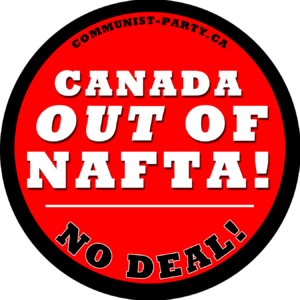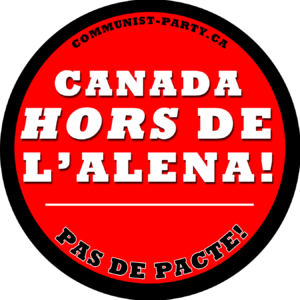 Submission to Global Affairs Canada’s NAFTA Consultations, by the Communist Party of Canada
Submission to Global Affairs Canada’s NAFTA Consultations, by the Communist Party of Canada
The Communist Party of Canada was among the first organizations in Canada to oppose the Canada-US Free Trade Agreement proposed by the Mulroney government in 1988 just months before that year’s federal election. Our opposition was based on our view that Canada’s sovereignty and independence was at stake with Canada’s escalated absorption into the US political, economic, and cultural orbit as the key feature and consequence of the FTA.
Most Canadians were unaware and surprised by the Tories’ support for the FTA, as Mulroney had opposed free trade in an earlier election campaign. But the extraordinary efforts of the labour and democratic movements, the Communist Party, the NDP, and some others to expose the real impact that the deal would have on Canada, nearly defeated the deal in the court of public opinion, in the few short months leading up to the election.
Mulroney’s victory in 1988 was based on his unfounded promises that free trade would create thousands of new, well-paid jobs in industry and manufacturing, would raise wages and living standards across the country, and would open a new era of prosperity for Canada, as a result of expanded access to the US market.
In 1992, the Canada-US Free Trade Agreement was expanded to include Mexico, and new sections to the Agreement including, most importantly, Chapter 11: the Investor State Dispute Settlement (ISDS) mechanism which allows corporations to sue governments for lost profits. As a direct result, Canada is now the most sued country in the developed world.
 In 1993, five years later, after a deep recession and massive job losses in Canada, the Tory government was defeated – crushed – electing just two MPs to the House of Commons.
In 1993, five years later, after a deep recession and massive job losses in Canada, the Tory government was defeated – crushed – electing just two MPs to the House of Commons.
The reasons: the free trade agreements, corporate tax cuts, deregulation, privatization, and attacks on labour and democratic rights which, combined, had opened up Canada like a sardine can for large national and transnational corporations to maximize profits at the expense of Canada’s sovereignty and independence, of permanent, well-paid and unionized jobs in industry and manufacturing, of cultural and environmental protections, labour and democratic rights, and more.
NAFTA was exposed as a North American corporate constitution which was not about trade, but about corporate control of the continent, including the hobbling of national and local governments, control over resources and the environment, the workforce, culture and education, healthcare and every other aspect of our sovereignty and independence.
NAFTA also provided the transnational oil companies with sweeping new powers. The energy proportionality agreement embedded in NAFTA ensures that Canada maintains oil and gas exports to the US, irrespective of changing public policies and priorities. This agreement, written by the oil monopolies, has made it next to impossible for Canada to take the action necessary to meet its international commitments to reduce greenhouse gas emissions, by for example, closing the tarsands, nationalizing energy, and developing alternative energy sources under public ownership and democratic control.
Free trade opened a period of unprecedented corporate greed, impoverishing millions of people across the continent, driving down wages and pensions, destroying more than half a million value added manufacturing jobs and the domestic steel industry in Canada, stripping the country of manufacturing sectors such as appliance and agricultural implements, the garment and footwear industries, among many others, and eviscerating public services and social programs with government mandated austerity programs.
Free trade and the apocalyptic, concomitant policies of tax cuts, privatization, and deregulation enabled the redistribution of wealth into the pockets of the 1% and the biggest corporations, banks and hedge-funds, eventually leading to the 2008 crisis which rocked the capitalist system around the world.
In the nine years since, the banks and the corporations have recovered very well, with new corporate trade deals and sky-rocketing profits the order of the day, while working people continue to suffer mass unemployment, precarious work, increasing attacks on their wages and pensions, public services and social programs, growing household debt, and continuing attacks on their labour, civil and democratic rights.
This is capitalist globalization, and it is accompanied every step of the way by militarization, reaction, and war.
The Canadian government’s proposed renegotiation of NAFTA takes place in the context of a US administration committed to slash corporate taxes by 20% (or more), to repeal the Dodd-Frank Act and consequently speed-up the next global financial crisis brought on by deregulation and unfettered corporate greed.
The renegotiation takes places with a US administration whose xenophobic policies threaten US citizens and residents, and the world. This administration’s continuing attacks on civil and democratic rights, on the rights of women, Muslims, Black and Indigenous peoples, on immigrants, on the LGBTQi community, and on organized labour are a threat to democracy. This administration’s strong and well-documented connections to white supremacist and fascist organizations in the US and globally are chilling, and a demonstrated threat to democracy and to peace loving people everywhere.
The renegotiation takes place in the context of US aggression and acts of war in Syria, Afghanistan, and DPRK. These US crimes and provocations endanger global peace, security and stability. This renegotiation takes place in the wake of US demands that Canada greatly increase its financial and military support for NATO, and for deployments of Canadian soldiers to US hotspots around the world.
The US enters these renegotiations with threats and ultimatums, including a 20% tax on BC softwood lumber. As the PM has made very clear by his actions over the last six months, Canada will be responding to US demands for more access and more control over Canada’s economy, natural and energy resources, manufacturing and secondary industry, environmental, labour and social policies, and over our political decision-making, and over civil, labour, and democratic rights.
What the US wants in particular is for Canada to yield on softwood lumber, food sovereignty and supply management policies in agriculture, the single payer system in Medicare , public delivery of public services and social programs, culture, and education.; rules of origin on automobile parts and assembly and on other products manufactured in Canada. They want those manufacturing jobs to slide south to the US rust belt states which all have right to work laws and the much lower wages and poorer conditions that go with it.
They want a free hand to export and sell US goods in Canada even if it will hurt Canadian producers and workers. This includes the over-supply of milk in the US dairy states just south of Quebec and Ontario, where supply management doesn’t exist, and farmers are left to fend for themselves against the vagaries of the “market”.
They want a free hand for US corporations to invest in every sector including state owned enterprises, and in banking. They want Canada to adopt the same deregulation measures as the US, ensuring that Canada will not escape the next US triggered financial crisis. Regulation of Canada’s financial institutions that provided some insulation from the 2008 meltdown, won’t be there in the future.
They want to eliminate the NAFTA trade dispute panels contained in Chapter 19, where Canada has consistently won in the long-standing fight with the US over softwood lumber. They don’t like the panels’ softwood rulings, and therefore propose to get rid of the panels.
In previous negotiations side deals and agreements on labour standards, environmental standards were negotiated to meet the demands of the labour and environmental movements, and to eliminate opposition to these trade deals. However it’s now clear that none of the side agreements was of any use, because all of them were toothless and none of them were enforceable.
Now the US wants to include the side deals on labour and the environment to be included in the main NAFTA agreement. But only if they continue to be toothless and useless to defend workers’ rights and protect the environment. This is another pretty obvious effort to quiet widespread concerns in Canada and Mexico about NAFTA’s devastating impact on the environment and on labour rights and standards, and on democratic and human rights.
Canada’s relationship with the US has always been that of the mouse and the elephant. When the US catches a cold, Canada catches pneumonia. Today it could be reasonably said that the US has pneumonia.
Why would we want to get in bed with our politically and economically sick neighbour to the south?
 Instead of getting in deeper, losing ever bigger chunks of our sovereignty and independence, Canada should get out of NAFTA now while we can. Mexico has also expressed serious concerns about both NAFTA and the current US administration, and has publicly discussed pulling out of NAFTA. Canada should do likewise, and open up discussions on bi-lateral trade with Mexico on a mutually beneficial basis.
Instead of getting in deeper, losing ever bigger chunks of our sovereignty and independence, Canada should get out of NAFTA now while we can. Mexico has also expressed serious concerns about both NAFTA and the current US administration, and has publicly discussed pulling out of NAFTA. Canada should do likewise, and open up discussions on bi-lateral trade with Mexico on a mutually beneficial basis.
Instead of virtually unilateral trade with the US, which is our trading partner for 80% of our exports, Canada needs a new trade policy, based on multi-lateral and mutually beneficial trade with the world. This should include providing long-term credits to the developing countries, including Cuba and Vietnam.
Along with a fair and democratic trade policy, Canada should adopt a foreign policy of peace and disarmament, cutting our defence spending – not increasing it – and redirecting it to civilian spending. Canada should also adopt a tax policy based on ability to pay, which would increase taxes on corporations and decrease the tax load on working people and the unemployed. We should use the Bank of Canada to fund investments in the creation of good jobs and full employment, public healthcare, public and post secondary education, quality public childcare and affordable housing to help build a genuine and long-lasting recovery for working people across Canada, including hundreds of thousands of young people trying to get a foot in the door.
Rebuilding Canada’s manufacturing and secondary industry, developing an environmentally sustainable industrial strategy, a transportation policy that invests in mass public transit in cities and inter urban rail transit, in social housing at rents and prices people can afford, expanding Medicare to include dental and vision care, long term care and pharmacare; and developing an environmental policy that will create new green jobs and build up alternative energy sources within the publicly owned energy sector.
This is the way to a future worth having in Canada today. The alternative is to succumb to US political and economic demands, and transform Canada into the 51st US state, with all that entails.
We say NO to NAFTA, Get Out Now! We say YES to Canadian Sovereignty, Democracy, Peace and Jobs!
– Central Executive Committee CPC, July 18, 2018